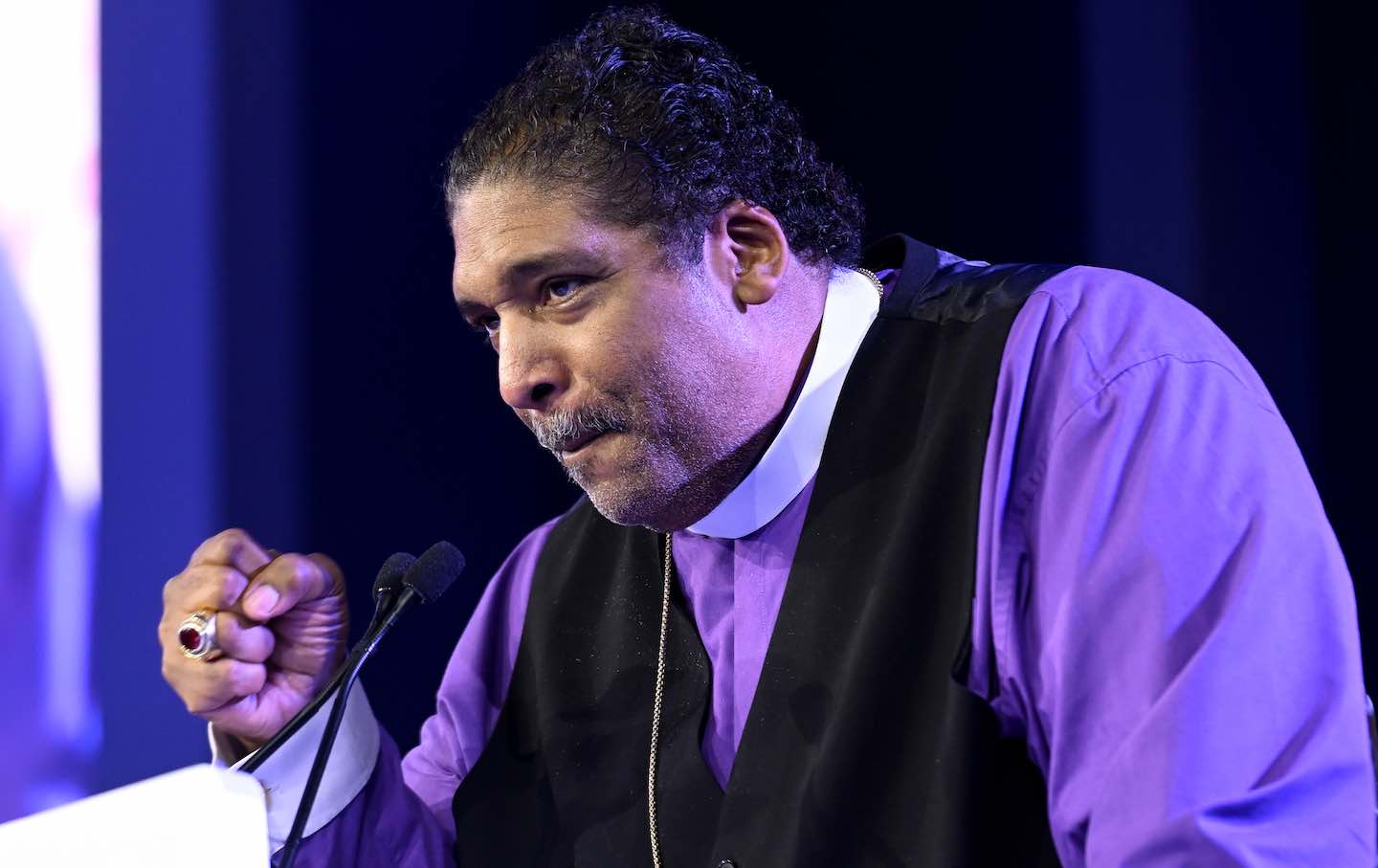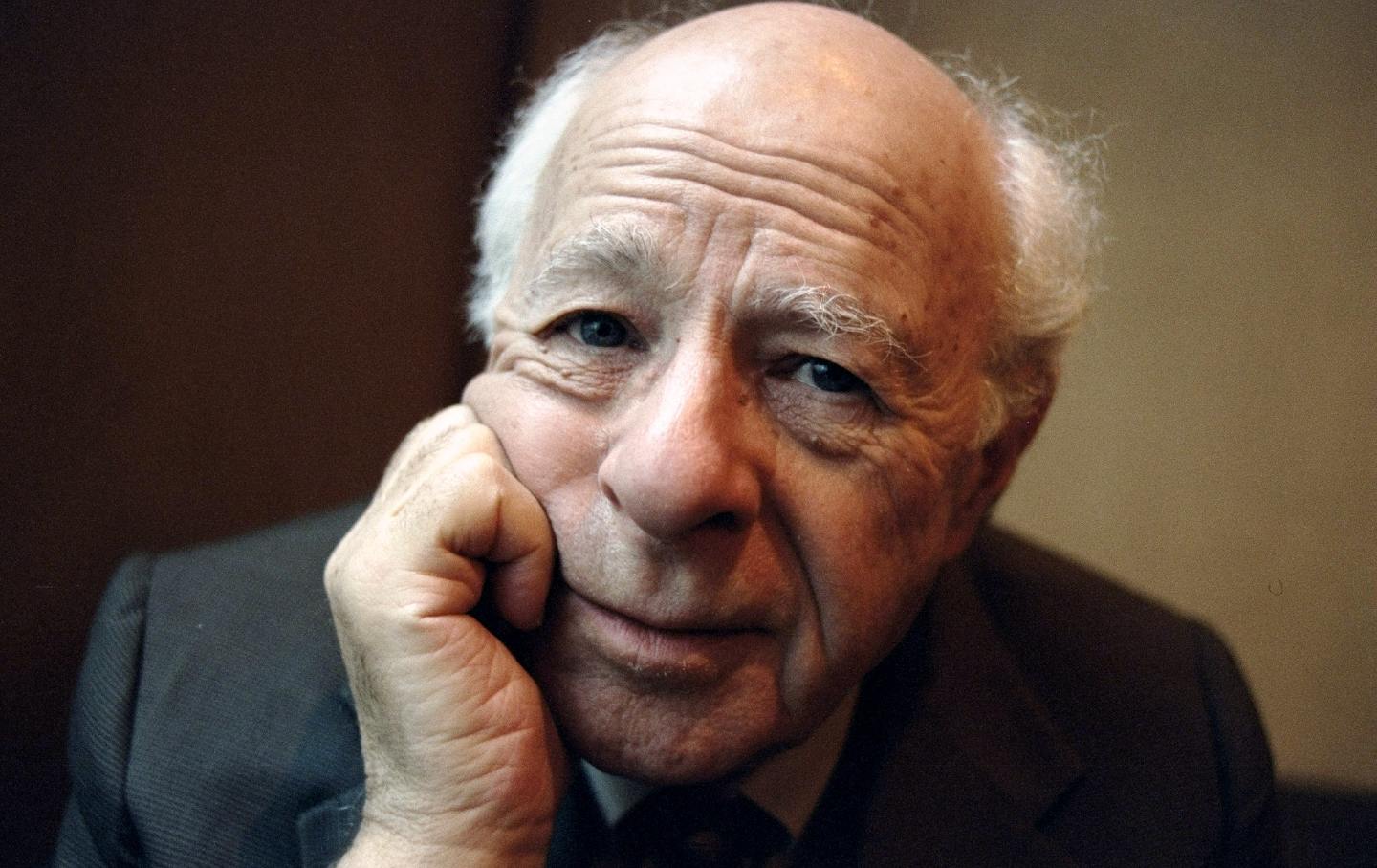The Rev. Barber and Other Faith Leaders Issue a Bold Call to Reject Christian Nationalism
The Rev. Dr. William Barber II and allies reject “divisive cultural wedge issues” in favor of “a public theology that is good news for all people.”

Bishop William J. Barber II speaks onstage during the Clinton Global Initiative September 2023 Meeting at New York Hilton Midtown on September 19, 2023, in New York City.
(Photo by Noam Galai / Getty Images for Clinton Global Initiative)“Heavyweight challenges require more than lightweight theology,” says the Rev. Dr. William Barber II, who is leading the charge for a prophetic Christianity that declares, “Justice and mercy is the very message that the 21st-century church needs to be preaching.”
This message, preached by the founder of the “Moral Mondays” movement preached at the opening of the inaugural conference of the Yale Divinity School’s Center for Public Theology & Policy, which Barber directs, is in stark contrast to the message of the extreme-right-wing Christian nationalist movement that Barber is calling on pastors, churchgoers, and political leaders to reject as antithetical to Christian values.
Barber has for many years been an outspoken critic of Christian nationalism. Several years ago, the longtime Disciples of Christ pastor, NAACP leader, and cochair of the Poor People’s Campaign: A National Call for a Moral Revival told an interviewer,
To suggest that if you’re against abortion, you’re against women’s right to choose, you’re for guns, for prayer in schools, for tax cuts, a Republican, then you have taken the moral position that is modern-day heresy. And we have to challenge it. But we’re not just going to challenge it just emotionally. We’re saying if you want to have a discussion about morality from a Biblical standpoint, then let’s have a real one.
Now, that challenge has come, in the form of the “New Haven Declaration of Moral and Spiritual Issues in the 2024 Presidential Election,” a call to action issued at the close of the conference. At a time when a growing number of Republican politicians and grassroots activists are identifying as Christian nationalists, and advocating policies that identify the United States as a Christian nation—rather than a diverse and pluralistic land with freedom of religion for all—the statement’s signers promise to “launch a season of preaching the moral issues of living wages and union rights, healthcare and ecological justice, an end to the spilling of innocent blood, a reimagination of criminal justice, and the protection and expansion of voting rights and equal protection guarantees.”
Held April 7–9 in New Haven, Connecticut, the conference drew clerics, scholars, academics, and activists from across the country with the aim of providing faith leaders and their allies with the tools to engage in the battle for the soul of the nation. Panel discussions and presentations featured experts on right-wing extremism, such as Anne Nelson, author of Shadow Network: Media, Money, and the Secret Hub of the Radical Right, and Nancy MacLean, author of Democracy in Chains: The Deep History of the Radical Right’s Stealth Plan for American. Election law specialist Marc Elias spoke about fighting voter suppression in the courts. LaTosha Brown, cofounder of the voting rights group Black Voters Matter, described campaigns to empower marginalized predominantly Black communities. The Rev. Dr. Richard H. Lowery, an ordained Disciples of Christ pastor and biblical scholar who served as dean of the Lexington Theological Seminary, offered a lesson on how the Book of Genesis provides a framework for democracy.
The mix of policy, strategy, and scripture distinguished the conference from traditional academic gatherings, as did the gospel music that began each day’s session. Several panels and presentations focused on getting to a deeper understanding of Christian nationalism, one that frames the discussion in moral terms that cross traditional partisan and ideological dividing lines. “The language of conservative and liberal does not fit this moment,” Barber explained. “I don’t care if you are liberal or conservative. I care about whether you stand for the least of these.”
That’s a message that is writ large in the New Haven Declaration.
The declaration warns that “a well-funded, coordinated political movement has co-opted our faith tradition and is exploiting so-called ‘traditional values’ to undermine democracy and divide people across this land.” And it explains, “This distorted religious nationalism has persuaded many well-meaning Christians to focus on a narrow set of divisive cultural wedge issues while ignoring the real moral issues that are at the heart of our Scriptures and tradition. We repent of not doing more to preach and teach against this misuse of our faith, and we pledge to proclaim in word and deed a public theology that is good news for all people.”
The signers of the New Haven Declaration ground their moral message in historic struggles:
We are not alone. We stand in the great moral tradition of Frederick Douglass, Sojourner Truth, and William Lloyd Garrison, who insisted that abolition was a moral issue; we stand with Ida B. Wells, Reverdy Ransom, and Walter Rauschenbusch, who insisted that concern for the poor was a moral issue; we stand with Francis Perkins, Howard Thurman, and Reinhold Niebuhr, who preached and practiced worker’s rights as a moral issue; we stand with Rosa Parks, Martin King, Dorothy Day, and Pauli Murray, who insisted that equal protection for all people is a moral issue; we stand with John Lewis, Fannie Lou Hamer, and James Reeb, who spilled their blood in the nonviolent struggle for voting rights as a moral issue.
We are surrounded by a great cloud of witnesses, and we are moving forward together to represent the majority of people of faith in this nation who want a democracy where everyone can thrive.
The agenda is rooted in broadened faith, rather than in the narrow confines of partisan politics. “From the top of the ticket to local state house and judicial races, it is not the job of pastors to tell anyone for whom to vote,” the document argues. “But preachers do have a responsibility to make clear how the tradition of Jesus and the prophets speaks to the world today. We must challenge our congregations and the wider public to choose carefully and wisely which candidates for public office best represent our true moral values.”
The initial signers of the declaration include Barber, Yale Divinity School Dean Greg Sterling, and a number of prominent faith leaders, such as the Rev. Teresa Hord Owens, who serves as general minister and president of the Christian Church (Disciples of Christ) in the US and Canada; Bishop Yvette Flunder, the presiding bishop of the Fellowship of Affirming Ministries; and the Rev. Sofía Betancourt, the president of the Unitarian Universalists Association. Another signer is Shane Claiborne, a cofounder of Red Letter Christians, the faith-based group with a mission of “combining Jesus and justice.”
The New Haven declaration echoes many of the messages that Barber has carried forward over the years as one of the nation’s most prominent preachers and activists on behalf of economic, social, and racial justice. What distinguishes the document is its ambition. With a call to conscience at a critical juncture in the American journey, Barber says, “We have to force the nation to make a moral choice.”
Disobey authoritarians, support The Nation
Over the past year you’ve read Nation writers like Elie Mystal, Kaveh Akbar, John Nichols, Joan Walsh, Bryce Covert, Dave Zirin, Jeet Heer, Michael T. Klare, Katha Pollitt, Amy Littlefield, Gregg Gonsalves, and Sasha Abramsky take on the Trump family’s corruption, set the record straight about Robert F. Kennedy Jr.’s catastrophic Make America Healthy Again movement, survey the fallout and human cost of the DOGE wrecking ball, anticipate the Supreme Court’s dangerous antidemocratic rulings, and amplify successful tactics of resistance on the streets and in Congress.
We publish these stories because when members of our communities are being abducted, household debt is climbing, and AI data centers are causing water and electricity shortages, we have a duty as journalists to do all we can to inform the public.
In 2026, our aim is to do more than ever before—but we need your support to make that happen.
Through December 31, a generous donor will match all donations up to $75,000. That means that your contribution will be doubled, dollar for dollar. If we hit the full match, we’ll be starting 2026 with $150,000 to invest in the stories that impact real people’s lives—the kinds of stories that billionaire-owned, corporate-backed outlets aren’t covering.
With your support, our team will publish major stories that the president and his allies won’t want you to read. We’ll cover the emerging military-tech industrial complex and matters of war, peace, and surveillance, as well as the affordability crisis, hunger, housing, healthcare, the environment, attacks on reproductive rights, and much more. At the same time, we’ll imagine alternatives to Trumpian rule and uplift efforts to create a better world, here and now.
While your gift has twice the impact, I’m asking you to support The Nation with a donation today. You’ll empower the journalists, editors, and fact-checkers best equipped to hold this authoritarian administration to account.
I hope you won’t miss this moment—donate to The Nation today.
Onward,
Katrina vanden Heuvel
Editor and publisher, The Nation
More from The Nation

The Longest Journey Is Over The Longest Journey Is Over
With the death of Norman Podhoretz at 95, the transition from New York’s intellectual golden age to the age of grievance and provocation is complete.

The Shocking Confessions of Susie Wiles The Shocking Confessions of Susie Wiles
Trump’s chief of staff admits he’s lying about Venezuela—and a lot of other things.

The King of Deportations The King of Deportations
ICE’s illegal tactics and extreme force put immigrants in danger.

The Epstein Survivors Are Demanding Accountability Now The Epstein Survivors Are Demanding Accountability Now
The passage of the Epstein Files Transparency Act is a big step—but its champions are keeping the pressure on.

Mayor of LA to America: “Beware!” Mayor of LA to America: “Beware!”
Trump has made Los Angeles a testing ground for military intervention on our streets. Mayor Karen Bass says her city has become an example for how to fight back.

Breaking the LAPD’s Choke Hold Breaking the LAPD’s Choke Hold
How the late-20th-century battles over race and policing in Los Angeles foreshadowed the Trump era.


